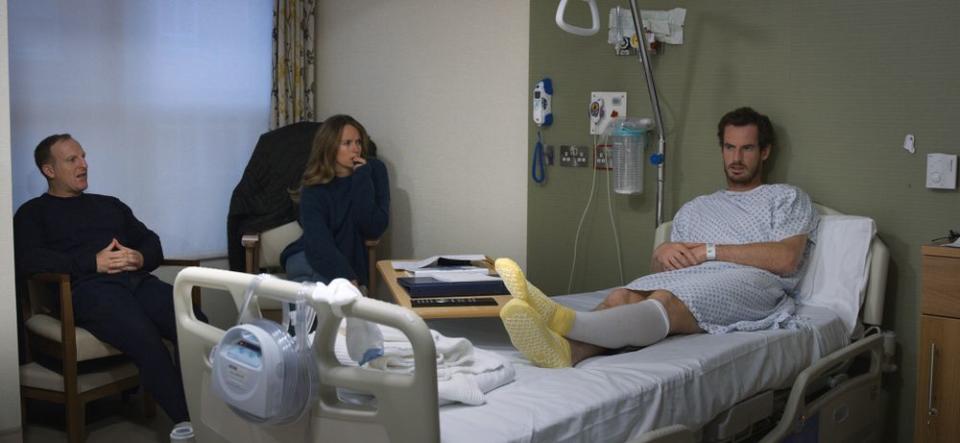Tennis Star Andy Murray Opens Up About the School Massacre That Changed His Life: 'We Knew the Guy'
Tennis star Andy Murray is reflecting on how an enormous tragedy two decades ago has shaped both his personal life and his professional career.
Growing up in the sleepy town of Dunblane, Scotland, the three-time Grand Slam winner was — like many others — forever changed by the events of March 13, 1996, when a local man named Thomas Hamilton drove into Murray’s school parking lot around 9:30 a.m. carrying four handguns.
Hamilton opened fire within minutes, killing 16 kindergarten students and their teacher in the school gym. Then he turned one of the guns on himself.
Murray, whose fourth-grade class was making its way to the gym but hid in a classroom at the sound of gunfire, had kept his feelings about the tragic day closely guarded — only once speaking about the events, to the BBC, in 2013.
But in the new Amazon prime documentary Andy Murray: Resurfacing — premiering Friday — the former world No. 1 explains how tennis provided an escape from the trauma of the shooting and its aftermath. And, Murray says, he had known Hamilton before that bloody day.
“You asked me a while ago why tennis was important to me. Obviously I had the thing that happened in Dunblane,” Murray tells filmmaker Olivia Cappuccini, according to The Independent and The Scotsman. “That was when I was around 9. I’m sure for all the kids there it would have been difficult for different reasons, but we knew the guy, we went to his kids’ club, he’d been in our car and we’d driven him and dropped him off at train stations and things.”
Within 12 months, Murray’s parents got divorced — a period he describes as “a difficult time for kids.”
Compounding his difficulties, around six to 12 months later, his older brother, Jamie, now 33 — who was also in the school when the shooting occurred — moved out of the family home for a tennis camp in Cambridge, England, some 370 miles to the south.
“We used to do everything together, so when he moved away that was also quite hard for me,” Murray reportedly says in Resurfacing. “Around that time and after that for a year or so I had lots of anxiety. That came out when I was playing tennis. A few times when I was competing, I would get really bad breathing problems.”
Instead of letting life beat him, though, Murray showed the kind of grit that has led him to two Wimbledon titles, a U.S. Open win and gold medals at both the 2012 and 2016 Olympic Games.

“My feeling towards tennis is that it’s an escape for me in some ways, because all of these things are bottled up. We don’t talk about these things,” he says in the Amazon documentary, according to The Independent and The Guardian.
“The way that I am on the tennis court, I show some positive things about my personality and I also show the bad things, the stuff that I really hate. But I feel like tennis allows me to be that child that has all of these questions,” he says. “That’s why tennis is important to me.”
Earlier this week, Murray acknowledged the Dunblane shooting is not something he often reflects on publicly. “I have not really spoken to anyone that much about it ever,” he said, according to The Guardian.
In the aftermath of Dunblane, the British government tightened gun laws, which have so far helped prevent another school massacre in the U.K.
Murray, who recently welcomed a third child with wife Kim Sears Murray, also hasn’t stopped fighting. The feature-length documentary details the tennis champion’s painstaking rehabilitation from a career-threatening hip injury in 2017, when he was the world’s top-ranked player and ready to defend his Wimbledon title.
Told in his own words and featuring exclusive access to his elite sporting world, Resurfacing follows Murray’s grueling two-year search for a cure, with a look into the most intimate spaces of his personal and tennis life, including surgical theaters and interviews with rivals Roger Federer, Rafael Nadal and Novak Djokovic.
“I knew I was at a critical point in my career,” Murray says in the documentary. “At times it felt like I was letting people down by not being able to perform on court, and I wanted to give them an insight into what I was going through. I wanted to show the ups and downs of professional sport.”
He continues, “The film will take you on a journey through what were some of the lowest, most difficult periods of my life both physically and mentally, and will hopefully show and inspire viewers, that with the right mindset and work ethic, anything is possible.”

